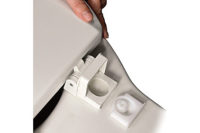"Home Depot and Lowe's say their primary target is the female consumer," she said. "This is a fundamental change for the industry."
As the industry continues to consolidate, those that bring value to the end consumer will prevail in the future, she said.
Value doesn't mean price. Market research indicates that end customers are willing to pay for simplifying their lives, she said.
Breininger said 76% of end consumers say they don't have enough time to get stuff done; 53% seek simpler lives; 81% are looking to reduce their stress levels; and 40% want brands that make them feel like they have made it.
The overwhelming majority of customers who are buying bath and kitchen products are not just looking for one item. Breininger said 85% of the purchases are related to an overall room purchase vs. buying a single product.
"Consumers demand choice and value but they want us to simplify the process, take out the risk and give them assurance," she said. American Standard tested a marketing idea with Lowe's home center stores about a year ago. They packaged everything needed to install a toilet inside one big box.
"Today that is Lowe's best-selling toilet," Breininger said. "The price did not go down. They charge more for the convenience. The wholesale channel is in the best position to provide this type of thing."
Consumers perceive wholesalers as having a competitive advantage in terms of service and expertise compared with big-box retailers, she said.
"This is particularly important in commercial and institutional and in high-end residential," she said.
American Standard is investing in Internet and classroom training and increasing the marketing of its brand, Breininger said.
"Your most valuable asset at wholesale is your people," she said. "We have to partner with you to make sure you maintain that point of distinction in the marketplace. Customers will pay for a brand that they believe they can trust, to reduce their risk. We are rethinking our warranties."





